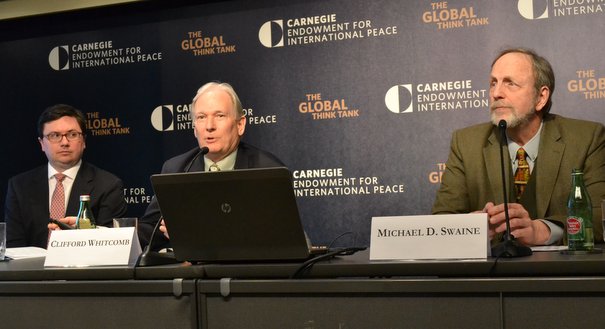{
"authors": [
"Michael D. Swaine",
"Clifford Whitcomb",
"Devin Ellis"
],
"type": "event",
"centerAffiliationAll": "dc",
"centers": [
"Carnegie Endowment for International Peace"
],
"collections": [],
"englishNewsletterAll": "asia",
"nonEnglishNewsletterAll": "",
"primaryCenter": "Carnegie Endowment for International Peace",
"programAffiliation": "AP",
"programs": [
"Asia"
],
"projects": [],
"regions": [
"North America",
"United States",
"East Asia",
"South Korea",
"China",
"Taiwan",
"Japan",
"Southeast Asia",
"North Korea",
"South Asia"
],
"topics": [
"Economy",
"Trade",
"Security",
"Military",
"Foreign Policy"
]
}
Cooperation and Conflict in the Asia-Pacific
Thu, April 2nd, 2015
Washington, DC
The Asia-Pacific region is undergoing a dynamic process of change, from patterns of military and economic power to social and political behavior. A variety of new and old features of this environment are driving both conflict and cooperation among the region’s major players, and in particular the United States and China.
The Asia Program of the Carnegie Endowment for International Peace was involved in a multifaceted, year-long project in conjunction with the Office of the Secretary of Defense and the Office of Strategic Multilayer Assessment, to identify and assess these changes over the long-term, anticipate future scenarios, and draw implications for U.S. policymakers. The resulting report, Conflict and Cooperation in the Asia-Pacific Region: A Strategic Net Assessment, utilizes a “strategic net assessment” approach in a study of Northeast Asia which details future prospects for cooperation and conflict in the Asia-Pacific region.
Carnegie’s Michael D. Swaine reflected on some of the report’s main findings. Cliff Whitcomb and Devin Ellis discussed other key components of the project. A question and answer session with other authors of the report followed.
Michael D. Swaine
Michael D. Swaine is a senior associate at the Carnegie Endowment for International Peace and one of the most prominent American analysts in Chinese security studies.
Clifford Whitcomb
Clifford Whitcomb is a professor and chair in the department of systems engineering at the Naval Postgraduate School in Monterey, California.
Devin Ellis
Devin Ellis is the policy and research program director for the ICONS Project at the University of Maryland Center for International Development and Conflict Management.
*The views and conclusions contained in this report are those of the authors and should not be interpreted as necessarily representing the official policies, either expressed or implied, of the U.S. Department of Defense and/or U.S. Department of Homeland Security.
Carnegie does not take institutional positions on public policy issues; the views represented herein are those of the author(s) and do not necessarily reflect the views of Carnegie, its staff, or its trustees.
Event Speakers
Swaine was a senior fellow at the Carnegie Endowment for International Peace and one of the most prominent American analysts in Chinese security studies.
Clifford Whitcomb
Clifford Whitcomb is a professor and chair in the department of systems engineering at the Naval Postgraduate School in Monterey, California.
Devin Ellis
Devin Ellis is the policy and research program director for the ICONS Project at the University of Maryland Center for International Development and Conflict Management.
